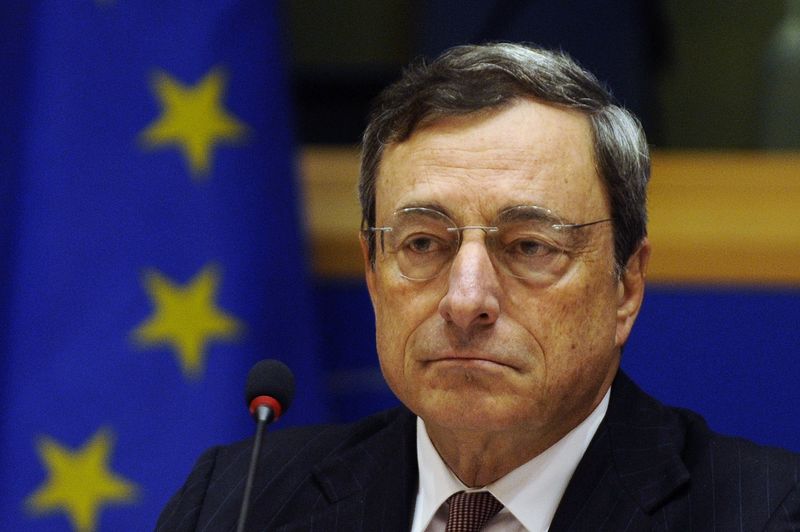Investing.com - As investors gear up to hear the latest monetary policy decision from the European Central Bank (ECB) on Thursday, markets widely expect there to be no changes in interest rates or the asset purchase program, although the monetary authority’s president Mario Draghi could give indications on his feeling of when an eventual reduction in asset purchases could occur.
The ECB's latest interest rate decision is due at 12:45GMT (7:45AM ET), though expectations are low for any action after the central bank surprised markets back in December by saying it would extend its monthly bond purchases through to the end of the year, but trimmed the amount by €20 billion to €60 billion euros ($63.6 billion) starting in April.
Most of the focus will likely be on ECB president Mario Draghi's press conference 45 minutes after the announcement.
Pointing to the policy actions taken in December,Morgan Stanley dismissed the likelihood of any moves being made at this meeting.
“Investors will most likely focus on whether the stronger growth and inflation data are having an effect on ECB thinking,” these analysts said in a note to clients.
A pick-up in inflation, both in Germany and the euro zone, prompted fresh calls from German economists for the ECB to raise interest rates and scale back its monetary stimulus.
Headline inflation for the region jumped to 1.1% in December from 0.6% in November, but experts from Brown Brothers Harriman think that Draghi can stress that one month’s data is insufficient to cause a policy shift.
“In addition to cautioning against jumping to conclusions based on one month's data, he may note that the rise in headline measures is primarily the result of energy prices,” they added.
The core rate of inflation was only 0.9% in December, well below the ECB’s 2% target.
Goldman Sachs highlighted this gap between headline and core inflation in a note to clients:
“Negative base effects for January and February are likely to push headline still higher, while the picture is the reverse for core, which our economists project to stay around 0.8% in 2017 and 2018, well below the ECB forecast,” the broker said.
Economists at Moody’s Analytics noted that rising inflation in Germany could rouse the opponents of quantitative easing.
“Nevertheless, we think that any discussion about lowering asset purchases is premature and expect the ECB will wait until price growth is sustainable and political uncertainty eases,” they said.
A recent Reuters poll found that the ECB's next policy move after April, when it is due to reduce monthly bond purchases, will be to cut the size of the quantitative easing program (QE) further, citing signs of economic stabilization and rising inflation.
Much along the same lines, analysts from Standard & Poor’s stated that “monetary policy is likely to remain accommodative until core inflation experiences a sustained adjustment of its path, probably not before 2018."
Analysts at UBS also expect the ECB to hold on tapering, as the reduction in the quantity of asset purchases is known, until the beginning of 2018.
“Under this scenario, the ECB’s tapering decision could come as early as September 7 or December 14 at the latest,” they predicted.
However, economists at Deutsche Bank recognized that a tapering announcement could come earlier.
“If current data trends continue, the outright taper decision could accelerate to June rather than September, but the latter is our baseline,” they suggested, adding that “mid-year is the earliest that the less convincing core inflation will satisfy the minimum conditions for policy tightening.”
With that type of timeline in the background, UBS outlined what they expect Draghi to speak about in the press conference: “a) the surprisingly firm euro zone PMIs and the pick-up in inflation in December and their likely implications for the monetary policy outlook; b) ongoing efforts to address the challenges in the Italian banking sector; c) the outcome of the ECB’s new Bank Lending Survey, as well as; d) the implications of potential changes in U.S. economic policy on Europe and the ECB monetary policy.”
